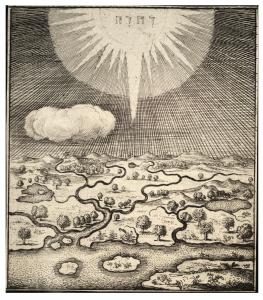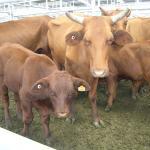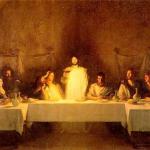 The whole of creation is filled with the glory of God. Even though it is usually hidden from us because of our sin, the presence of God is all around us, gently guiding us, so that we can find our way and eventually see and encounter it in its radiant beauty. We should be able to discern the Wisdom of God in all things, to see its influence everywhere. And yet, we do not because we have eyes which cannot see, and ears but cannot hear all that is being demonstrated right before us each and every moment of our lives. All things proclaim the glory of God. All things manifest the Wisdom of God for us. All things show us God because all of creation comes from God.
The whole of creation is filled with the glory of God. Even though it is usually hidden from us because of our sin, the presence of God is all around us, gently guiding us, so that we can find our way and eventually see and encounter it in its radiant beauty. We should be able to discern the Wisdom of God in all things, to see its influence everywhere. And yet, we do not because we have eyes which cannot see, and ears but cannot hear all that is being demonstrated right before us each and every moment of our lives. All things proclaim the glory of God. All things manifest the Wisdom of God for us. All things show us God because all of creation comes from God.
The Wisdom of God is revealed not only by what has already been made, but what is being made and what will be made in the future. Creation is an ongoing process; all throughout time, creation will continue to generate and present new forms of being, each presenting and incarnating another refection of the Absolute into itself.
God could have established all that was, is, and will be in an instant of time, and in the next instant, take it away. But that was not his intention; he planned to have his Wisdom reflected within the world. All that is in God is God, and is simple God, so that Wisdom (Sophia) is God; but when those qualities are reflected in their created analogies, they are no longer simple like they are in God. They come forth in time, show themselves in time, and come to their own end in time; the creaturely image of God’s Wisdom, creaturely Sophia, therefore presents the contents of God’s Wisdom in the forms of being which are established through the history of creation. What is found in His Wisdom, the contents of His Wisdom, become the basis for the forms which come into existence in the world. He has seeded in creaturely Sophia, but because creaturely Sophia is established in creation, she is temporal in form, and her contents reveal themselves in temporal form, some coming out at one time, others at another, as the seeds planted in her slowly come to fruition.
Since God’s Wisdom is himself, and nothing but himself and what he is by nature, he could not transform it into contingent being. This is why he established creaturely Wisdom, the source and foundation for the rest of creation through which creation itself is formed. It is a part of time, it is found in time, and so it has its place in time and can be found changing in time. But yet, in the eternal sense, God establishes all things in his eternal Wisdom, eternally existing in and of himself, as himself; but to give all things being, a share in existence, a contingent form of existence, all things in his Wisdom establish the basis of their creaturely analogue, which is then contingent upon God and has its existence in participation of his own divine existence. This allows a union to come into existence, because creaturely Wisdom is found united with and participating in Divine Wisdom; God unites in himself (through the hypostatic union of the Logos) all things unto himself so they can become one in him. What he grants is a participatory, compounded unity which brings all created things into an interdependent relationship with each other, and in their union as one in creaturely Sophia they can then find themselves united through the Logos with God.
All things in God’s Wisdom are manifest in creation through his creaturely Wisdom. They all receive being from Him, and yet see themselves as tied with and one with his creaturely Wisdom. This is a great mystery, indeed, it is the mystery of creaturely being itself. Some find themselves relating to and focusing in on temporal creation and so seek out and discern all they can of creaturely Wisdom; others recognize the foundation of creaturely Wisdom in Divine Wisdom, and the transcendence of Divine Wisdom, and focus on the Divine, ignoring the creaturely Wisdom from which they have emerged. Through the revelation of the incarnation, of the God-man, we are shown that God in his humanity ties all of creation together as one, affirming creaturely Wisdom and healing her from the wounds of sin.
Even in time, creatures can find their place in creaturely Wisdom and through her come to Divine Wisdom. Indeed, they will find what they have from her, even if they do not know it before, comes through her by Divine Wisdom so all things truly are nourished by Divine Wisdom. St. Ambrose, reflecting upon the innate wisdom found in the variety of creatures on the earth, that is, the natural instincts they follow for their own good, hints then at the mystical truth:
He has left nothing unexplored, nothing unrevealed. He sees all who nourishes all. He fills all things with wisdom who, as it is written, ‘has made all things in wisdom.’ [1]
Wisdom has made all things in Wisdom: Divine Wisdom has made all things in creaturely Wisdom. This truth is what the Arians misunderstood; they believed the Logos was creaturely Wisdom and not the Wisdom of God, Divine Wisdom.[2] Creaturely Wisdom was made the first of creation, to be the heart of creation; from it all the contents held in Divine Wisdom could find their temporal form, so that creaturely Sophia could be said to produce all the things she explores in Divine Wisdom, revealing them in time.
We are, therefore, reflections established in time from the Divine Wisdom through creaturely Wisdom. But as creaturely Wisdom establishes us through what she discerns from Divine Wisdom, we are also from Divine Wisdom and so are made in the image and likeness of God. This means, like creaturely Wisdom, we are also forms of Wisdom, manifesting in ourselves a microcosm of creaturely Wisdom. What is given to creaturely Wisdom is therefore given to us, in a limited form. We are called to continue in the process of creation, of revealing the glory of God; this is done in word and in deed, and what we do, therefore establishes more means by which the presence of God is found in creation. As some following the Kabbalah understood, this meant that God’s presence can somehow be detected even in our story telling, which should not be surprising:
The essential thing is that people should focus their minds in order to understand that God, may He be blessed, is in every place and in every undertaking. If so one can also sense aspect of the Creator, may His name be blessed, in stories just as in one’s study of Torah and one’s prayers.[3]
Thus, in our creativity, in stories and in art, we continue to reflect upon the Wisdom of God and manifest it in the world. We continue the work of the enfolding of God’s presence in time and space, establishing for us in time new forms of being which point to God and so are capable of being symbols by which we can come to know God better. Study of human achievement, of our great works in history, need not be seen as a study which leads us away from God, but as a means by which we continue to come face to face with the presence of God. But we must always engage such study with caution, lest we confuse the symbolic pointer in creation to the Absolute itself as it is, and thus lost in a maze of our own creation.
[IMG=Creation of the Earth by Wenceslas Hollar via Wikimedia]
[1] St. Ambrose, “Hexameron” in Saint Ambrose: Hexameron, Paradise and Cain and Abel. Trans. John J. Savage (New York: Fathers of the Church, 1961), 190.
[2] All three persons, Father, Son and Holy Spirit are Divine Wisdom, for all three are the fullness of God, and are what God is in his divine simplicity.
[3] “Toldot Yaakov Yosef” in The Kabbalisitc Tradition. Trans. Alan Unterman (London: Penguin Books, 2008), 23.
Stay in touch! Like A Little Bit of Nothing on Facebook













